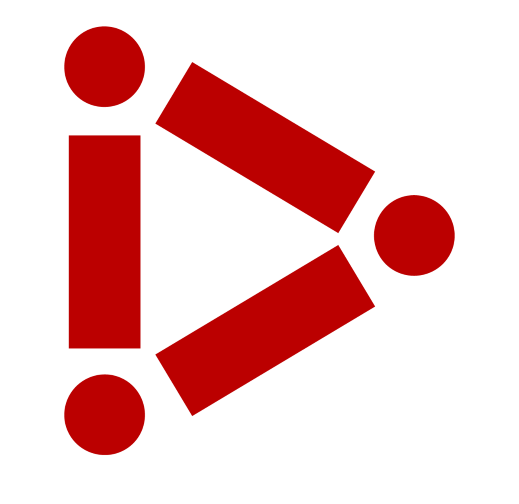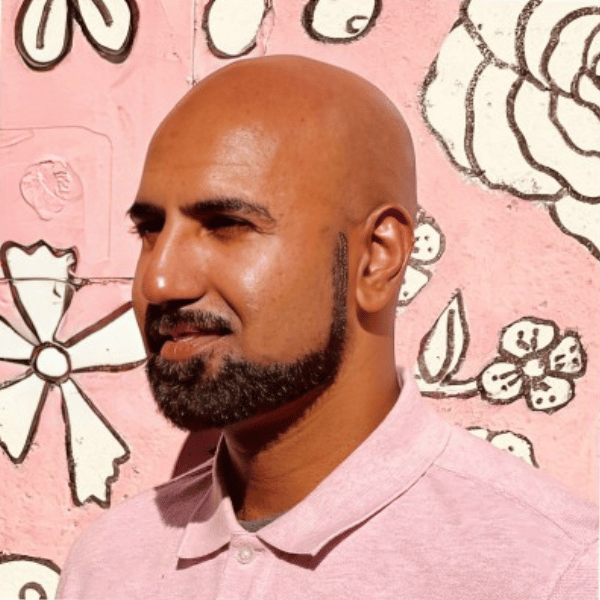A Propensity for Problem Solving: An Unexpected Path to Product
As a product manager for the Presence Platform at Meta’s Reality Labs, Muneeb Rasool (MSSM ‘22) is solving complex problems at the forefront of the next technological frontier - a departure from his initial American dream of working on Wall Street.
By Mary Kilcoyne
In 2010, one life ended, figuratively, so another could begin: Muneeb Rasool bid goodbye to the familiar and familial, leaving Pakistan at age 20 to study in the United States.
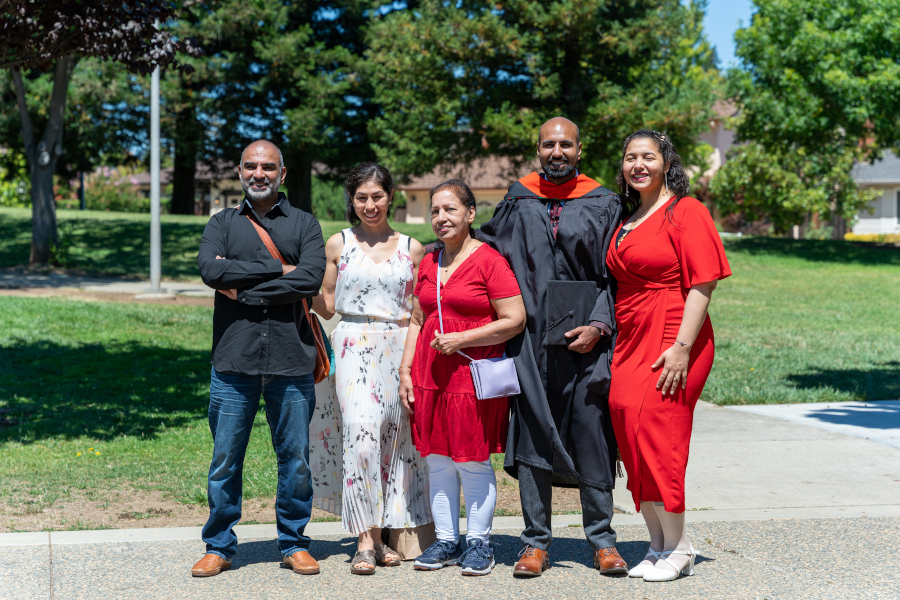
Rasool (2nd from left) celebrates graduation in August 2022 alongside his family and wife.
“In Pakistan, living in your parents' house, often the family's ancestral home, for your whole life is common. This offers substantial support, but life can be quite sheltered," Rasool noted.
"It contrasts with the United States, where independence is encouraged from age 18. I was eager to experience international cultures and different perspectives. I saw the United States as an opportunity for growth. I was drawn to the openness and diversity this country fostered. Moving here marked a new chapter for me, learning to be independent and self-reliant. I experienced a whole different mode of life.”
Life began anew at Minnesota State University, which offered Rasool a scholarship that made his educational ambitions feasible.
“When the visa officer at the American Consulate in Pakistan asked me why I wanted to study economics for my undergrad, I distinctly remember telling her, ‘Because I want to be an investment banker on Wall Street. That’s how you make the most money in the world.’ She cackled at that,” Rasool recalled.
When plotting his future career, Rasool did not account for a key factor though: his passion for solving problems.
That propensity led him away from Wall Street and onto the path of entrepreneurship and product management.
This redirection began soon after arriving at Minnesota State.
Rasool dove into extracurriculars, becoming vice president of the International Students Association. He quickly identified a problem impacting all student organizations: a gap between students and their awareness of campus activities.
To solve this issue, he and his friends built a platform to match students and on-campus events by interest, which resulted in the creation of CampusDodo and the launch of Rasool’s entrepreneurial journey.
Within six months, a large number of students had joined the platform to receive a personalized event digest delivered directly to their inboxes and calendars.
“My Wall Street dreams fizzled away when I realized that something that was just a thought in my mind had manifested into a reality that positively impacted students’ lives. I wanted to do more of that."
Leadership at Minnesota State took notice of the effect on student engagement, and they too wanted more. Rasool and his co-founders met with CIOs from Minnesota State’s consortium of schools.
Based on the CIOs’ feedback, the team pivoted CampusDodo’s algorithm from one based on interest to one that mapped curriculum pathways based on a student’s course history. The final product was a learning management system (LMS) called Edify.
“We landed a deal to pilot Edify at Minnesota State University. That’s when I knew what I had built was real. I knew that I wanted to go into technology and that I wanted to build products,” Rasool said.
Soon after the pilot, Rasool graduated and also had to exit from Edify.
“I was looking for a company that would sponsor my work visa and received an offer to be a product manager at a growing startup (Etail Solutions), which did agree to sponsor me. However, my application wasn’t chosen in the H-1B lottery. The whole immigration pipeline in the US is broken, especially skill-based immigration. I had to enlist in the U.S. Army via MAVNI program and, later, fought a prolonged legal battle against the Trump administration to get my U.S. citizenship, but that’s a story for another day.”
Evolving CampusDodo to Edify had unearthed another problem, which coincided with Rasool's visa dilemma. He didn’t know how to build technology startups.
“My co-founders had transferred out by the time we started to pilot Edify so I had to look for new technical co-founders. At the same time, I was doing rigorous customer development and go-to market strategy, pivoting the business model of CampusDodo/Edify from B2C to B2B. It is not possible to execute on ideas, especially in the technology world, without understanding the intersection of technology with business. I had no formal training on how to build a startup, what principles and frameworks are relevant, and how to grow in the capacity of an entrepreneur and PM,” Rasool shared.
Rasool wanted to learn how to build with technology while simultaneously understanding the economics involved in the process. A Goldilocks’ search for a solution is ultimately what led him to the Integrated Innovation Institute’s Master of Science in Software Management (MSSM) degree program.
However, before joining the MSSM program, he enrolled in a software engineering masters program.
“I wanted to understand engineering concepts, software architectures, and their impact on building scalable business models. However, I realized that in this program I was learning a different skill - writing software programs, which didn’t map to where I wanted to take my career,” Rasool reflected.
Then, he started an MBA, hoping to develop more of a management mindset that could help him be a better entrepreneur and PM. Instead, he found himself “absolutely bored” out of his mind by the second semester.
“My issue with the MBA is that there was a disconnect between learning generic academic business concepts and applying them to a technology business. It was not providing me any value. Technology businesses are different. They are skilled differently, and the economics are different."
In his search for the right academic fit, he learned about the iii and planned a visit to the CMU-SV campus. As he waited to meet with Program Director Gladys Mercier, a chance conversation with Professor Ravi Thomas solidified Rasool's interest in the MSSM program.
“Professor Thomas inquired about my current role. I detailed my involvement on behalf of my then employer (Whispir.com) in initiating a major partnership with AWS as the global launch partner for Amazon Eventbridge. This discussion evolved into a deep dive on how to optimally price software integrations above and beyond the basic SaaS subscription tiers," Rasool explained.
"That conversation was so insightful and practical to my day-to-day as a product manager. At that moment, I knew that I had found my people! I wanted to learn more from Professor Thomas and to experience what the MSSM program had to offer. That’s when I decided to enroll."
Now, as a product manager for the Presence Platform at Meta’s Reality Labs, Rasool is solving complex problems at the forefront of the next technological frontier.
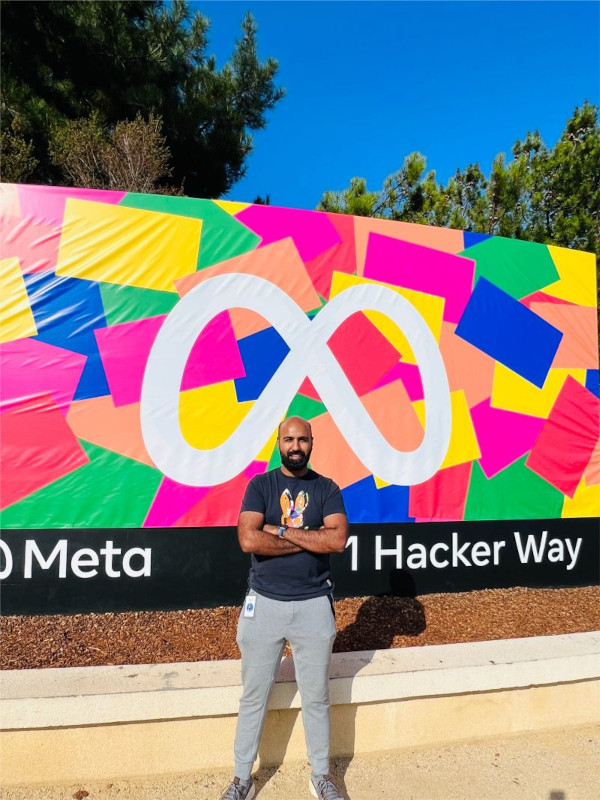
“Spatial computing is the next frontier. We will infuse computational power into our environment creating endless possibilities for productivity, social interactions, and media consumption. Imagine having a movie night with friends who are right next to you yet physically miles away. When physical space starts to dissolve, interesting possibilities emerge," Rasool said.
"The specific problem that I work on is how to improve the third-party developer experience as they build immersive and ‘embodied’ experiences on Meta’s Quest Platform. There are a number of complex computer vision algorithms that are foundational to Meta Quest headset’s OS. I lead the initiatives that help third-party developers better understand the potential of the Quest platform and how to leverage it in building Mixed Reality applications."
Before joining the Reality Labs team, Rasool had not worked in augmented reality (AR)/virtual reality (VR).
“At Metromile, a disruptor in the auto insurance industry, I had some experience working with hardware, as we used car telematics data via an OBD scanner to price insurance risk. It was an interesting space but not nearly as complex as building a spatial computing platform. My experience at Metromile didn’t directly map to Reality Labs,” Rasool shared.
“However, Meta’s philosophy towards product management is that if you are a good generalist PM, you do not need to be a technical specialist to deliver meaningful impact in a product space.”
Rasool believes that identifying high-value problems to be solved is at the heart of product management. He credits Thomas’ course, The Business of Software, with refining his product management lens.
“I had always led with vision and passion, which are good motivators. However, to be an effective product manager, you must frame product ideas in terms of reducing cost or increasing revenue. Those are the two levers that make a product useful; everything else in your framing is fluff,” Rasool explained.
“At the end of the day, product managers are professional critical thinkers and problem solvers, and CMUiii is in the business of training them.”
— Bonus Content —
COVID & Community
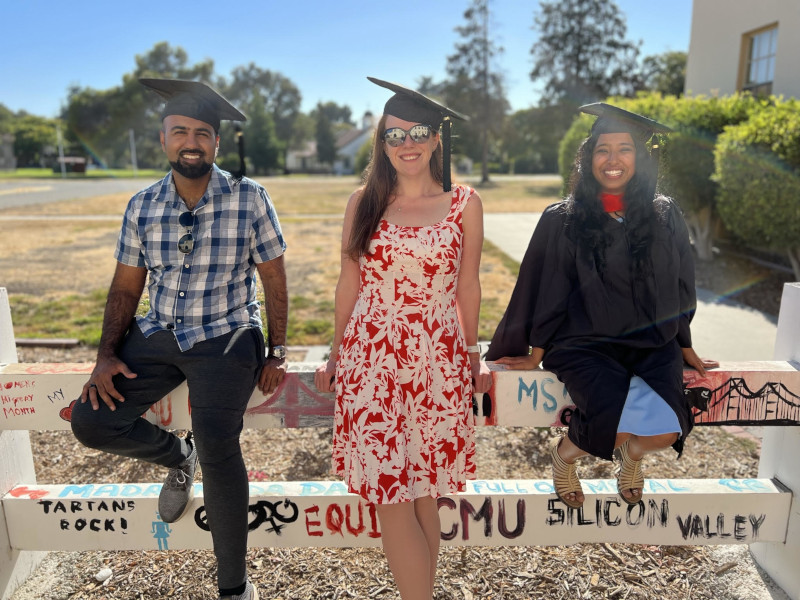
The whole plan was that as soon as COVID-19 goes away in a couple months, I’ll move to the Bay Area, work in San Francisco at Metromile’s Headquarters, and attend classes in person. So I was never registered as a remote student because I was always going to move to Mountain View.
Well, the majority of my masters ended up being in Seattle, and my entire tenure at Metromile ended up being remote as well.
One of the closest friends that I made in the program is actually in Missouri – Amanda Quint. As soon as we met, it was an instant friendship because we already knew so much about each other after taking classes together for two years.
When my batchmates from the full-time program visited me in Seattle, it was the first time meeting my CMU people in person. I felt like I was part of a community of peers and friends. There was already a lot of context established because we had been communicating at an intellectual level.
In-person community is still important to solidify relationships. The definition of community, though, has changed post-pandemic. Now our connections are global and transcend both physical and virtual worlds.
At Reality Labs, we are trying to mimic the advantages of physical reality into virtual and digital reality. The embodiment aspect of virtual reality is the most complex and the most exciting piece. Ultimately, the goal is to feel like we are in the same physical space regardless of actual location.
Muneeb's Favorite Products
ChatGPT
It’s not really a product from my perspective, but it has created the potential to build a whole new class of products that weren't possible before. Even in its rudimentary and nascent form, the technology is transformative in terms of 10x-ing our efficiency. It’s a paradigm shift in collective human understanding and in knowledge acquisition and generation.
My favorite Meta products are Facebook and Messenger.
When I came to the US, I stayed in touch with the world I left behind thanks to the technology and the network that Facebook has created. Messenger has made me feel that in certain ways I never left.
When my eldest brother moved to the US in ’92, we'd call him once a month via an operator. We were five siblings plus my parents, so I would never get to talk to him. On the second minute, the operator would interrupt that the time was up, and the call would abruptly end.
Comparatively, during my US citizenship ceremony, my mom had my fiancée, now wife, on a Messenger video call so she could watch me receive my certificate. These products have been so close to me. They enable us to share every moment, every important milestone. That’s revolutionary in its own sense.
